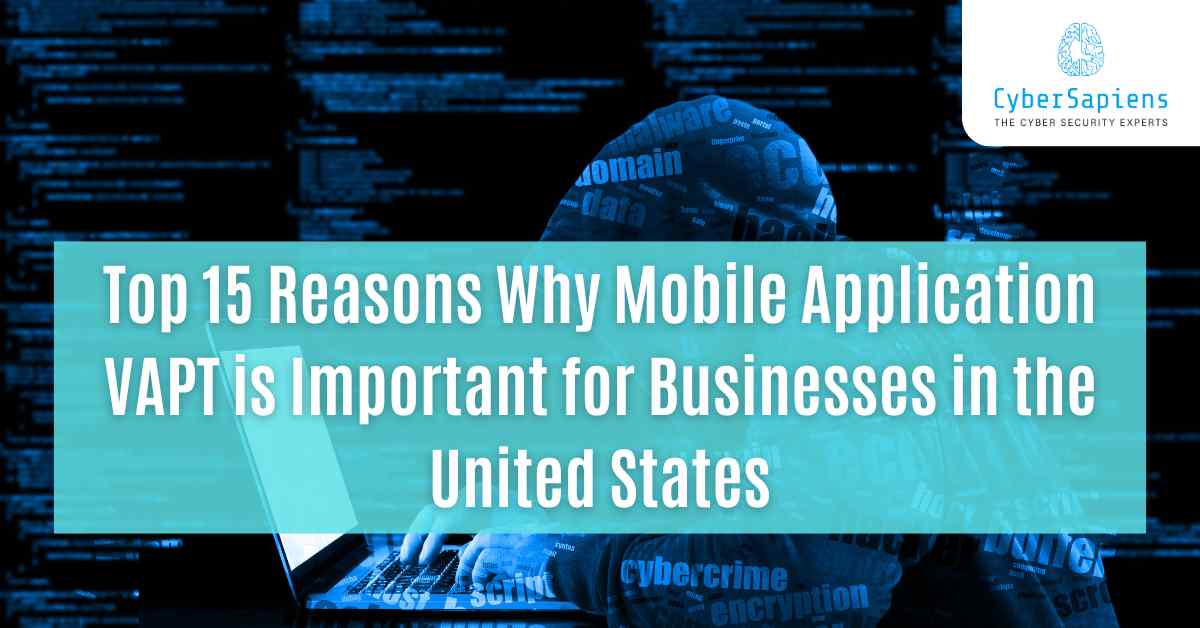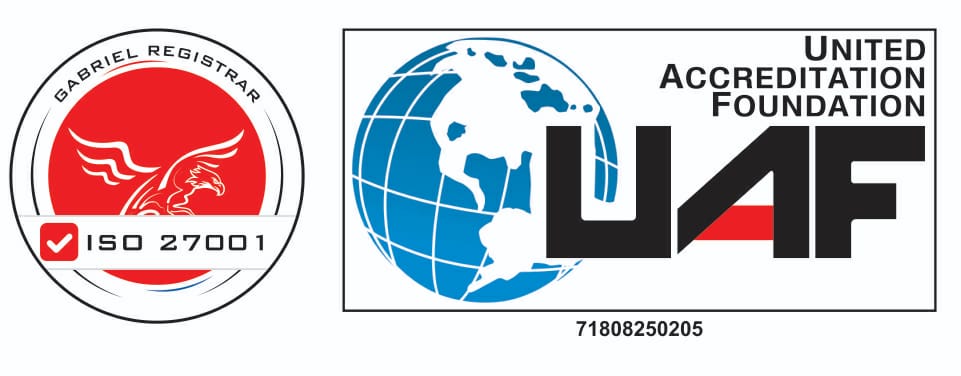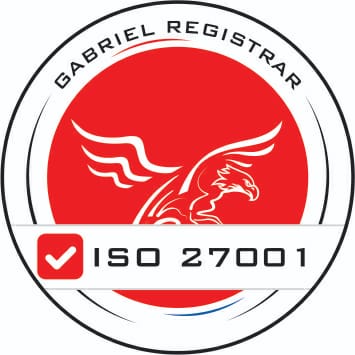Mobile applications are a crucial component in various organizations in the United States, especially in the current society that is characterized by advanced technology.
Smartphones have become important tools for business interaction with customers and a primary means to offer services and generate income through mobile applications.
However, in recent years specifically, with the introduction of mobile applications, security aspects have also emerged.
Mobile Application Vulnerability Assessment and Penetration Testing (VAPT) is a unique and significant process that is used to recognize the security flaws of mobile applications.
In this article, we will explore the top 15 reasons why Mobile Application VAPT is important for businesses in the United States.
Understanding Mobile Application VAPT
Before diving into the reasons, let’s briefly understand what mobile application VAPT details. It is a comprehensive security assessment process that identifies and exploits vulnerabilities within a mobile app.
VAPT combines manual and automated testing techniques to uncover potential weaknesses that malicious actors could exploit.
List of Top 15 Reasons Why Mobile Application VAPT is Important for Businesses in the United States
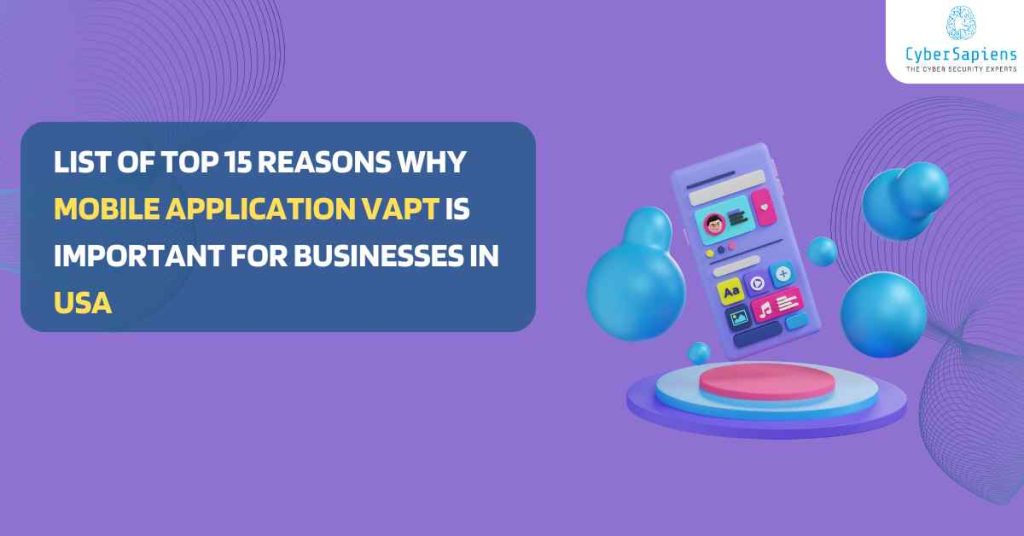
Here comes our main topic let’s see the list of the Top 15 Reasons Why Mobile Applications VAPT are Important for Businesses in the United States:
1. Protection of Sensitive Data
Mobile applications often handle sensitive user data, such as personally identifiable information, financial data, and login credentials.
If a mobile application is not properly secured, this sensitive data can be compromised, leading to identity theft, financial loss, and reputational damage.
Mobile application VAPT helps identify vulnerabilities that can be exploited by hackers to gain unauthorized access to sensitive data.
2. Prevention of Financial Loss
In the case of a mobile application, businesses stand a high chance of losing lots of money through a security breach.
As per a report done by IBM, the total expense of a security breach in the United States of America stands at approximately $8.2 million.

3. Compliance with Regulations
Mobile application VAPT is especially important these days since almost every company has to have secure and GDPR and CCPA-compliant data.
These regulations mean that the companies should work on better security to ensure the user data’s safety.
4. Protection of Brand Reputation
An operational security threat in a mobile business app can threaten brand image reducing customer confidence or possibly causing the brand to switch to competitor’s products.
5. Identification of Vulnerabilities
The mobile application VAPT analyzes the risks and weaknesses in mobile applications such as SQL injection, cross-site scripting, and other issues concerning the insecure storage of data.
6. Prevention of Malware Attacks
VAPT for mobile applications allows one to avoid malware attacks since the application will always point out the areas that have possible weaknesses to a malware attack.
7. Secure Authentication and Authorization
Mobile application VAPT verifies that the particularity and access rights are safeguarded so that one cannot get admission to significant information and functions.
8. Secure Data Storage
Mobile application VAPT also checks that data is kept saved securely, from the hands of intruders or people who may wish to have access to the data.
9. Prevention of Man-in-the-Middle (MITM) Attacks
As for protecting against MitM attacks, such as having the hacker intercept communication between the user’s device and the server, Mobile application VAPT detects risks that could allow a hacker this opportunity.
10. Compliance with Industry Standards
Mobile application VAPT ensures that companies remain up to date with industry compliance regulations like the Payment Card Industry Data Security Standard (PCI DSS) and the Health Insurance Portability and Accountability Act (HIPAA).

11. Reduced Risk of Data Breach
Mobile application VAPT helps minimise the threat of data breaches by carrying out an analysis of all possible vulnerabilities so that they cannot be utilized by hackers.
12. Improved Customer Trust
Mobile application VAPT enables an organization to attract more customers by showing one’s concern towards the security of customer data and the protection of their privacy.
13. Competitive Advantage
Security and Data protection are important to most users and customers and with Mobile application VAPT, shows that there is an effort to secure the application and data.
14. Increase Transparency and Visibility
Mobile Application VAPT provides businesses with transparency and visibility into their app’s security, enabling them to make informed decisions about security investments and resource allocation.
15. Support DevOps and Continuous Integration
Mobile Application VAPT integrates seamlessly with DevOps and continuous integration, enabling businesses to identify and remediate security vulnerabilities early in the development cycle, reducing the risk of security breaches and saving time and resources.
Best Practices for Implementing a VAPT Process
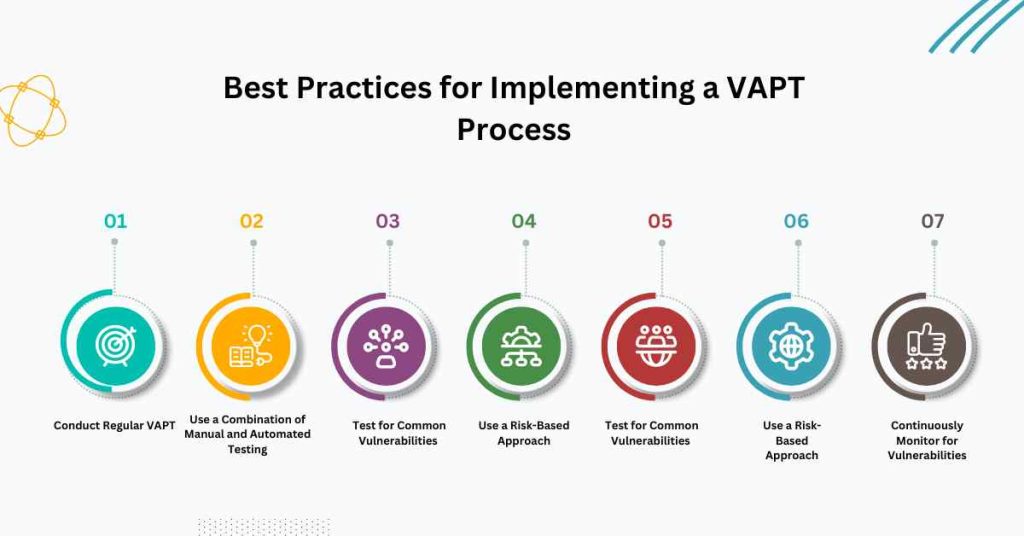
1. Conduct Regular VAPT
By routinely conducting VAPT, an organization can manage to point out the loopholes that hackers can use in their acts.
2. Use a Combination of Manual and Automated Testing
Manual and automated testing go hand in hand to give the best overview of the various weaknesses present in a system.
3. Test for Common Vulnerabilities
Check for general hazards like SQL injection attacks and cross-site scripting.
4. Use a Risk-Based Approach
Risk analysis is relevant as it allows categorizing the vulnerabilities concerning the level of associated risk.
5. Involve Stakeholders
Include the development, test and security teams because they will help in incorporating the checks.
6. Use Industry-Recognized Tools
Ensure that all VAPT is performed comprehensively and efficiently by using tools and frameworks recognised in the industry.
7. Continuously Monitor for Vulnerabilities
To establish the regularity of looking for vulnerabilities, test especially to ensure that new vulnerabilities have been found.
Summary
Here is the summary of the blog titled “Top 15 Reasons Why Mobile Application VAPT is Important for Businesses in the USA“
- Protection of Sensitive Data
- Prevention of Financial Loss
- Compliance with Regulations
- Protection of Brand Reputation
- Identification of Vulnerabilities
- Prevention of Malware Attacks:
- Secure Authentication and Authorization
- Secure Data Storage
- Prevention of Man-in-the-Middle (MITM) Attacks
- Compliance with Industry Standards
- Reduced Risk of Data Breach
- Improved Customer Trust
- Competitive Advantage
- Increase Transparency and Visibility
- Support DevOps and Continuous Integration
Conclusion
In conclusion, the mobile application VAPT is crucial for businesses in the United States to protect sensitive data, prevent financial loss, and comply with regulations.
By identifying and addressing vulnerabilities, businesses can prevent security breaches, protect their brand reputation, and demonstrate a commitment to security and data protection.
FAQs: Top 15 Reasons Why Mobile Application VAPT is Important for Businesses in the United States
1. What is the mobile application VAPT?
Ans: Mobile application VAPT is a security assessment process that identifies and exploits vulnerabilities within a mobile app. It combines manual and automated testing techniques to uncover potential weaknesses that malicious actors could exploit.
2. Why is the mobile application VAPT important for businesses?
Ans: Mobile application VAPT is crucial for protecting sensitive data, preventing financial loss, maintaining customer trust, complying with regulations, and mitigating risks. It also helps improve user experience, protect intellectual property, and enhance the overall security posture of a business.
3. What types of vulnerabilities does the mobile application VAPT uncover?
Ans: Mobile application VAPT can uncover a wide range of vulnerabilities, including insecure data storage, insecure network communication, improper authorization and authentication, injection flaws, sensitive data exposure, broken cryptography, and more.
4. How often should a mobile application undergo VAPT?
Ans: The frequency of VAPT depends on factors such as the app’s complexity, the industry it operates in, and the level of risk involved. Generally, it is recommended to conduct VAPT at least once a year, but more frequent assessments may be necessary for high-risk applications.
5. What is the typical process for a mobile application VAPT?
Ans: A typical mobile application VAPT process involves requirements gathering, threat modelling, vulnerability scanning, penetration testing, reporting, and remediation.
6. Does the mobile application VAPT cover both iOS and Android platforms?
Ans: Yes, mobile application VAPT should cover both iOS and Android platforms as they have different security architectures and potential vulnerabilities.
7. How can the mobile application VAPT improve a business’s bottom line?
Ans: Mobile application VAPT can improve a business’s bottom line by preventing costly data breaches, reducing legal liabilities, and enhancing customer trust. It can also help improve the efficiency of the development process by identifying vulnerabilities early on.
8. Does the mobile application VAPT have a positive impact on user experience?
Ans: Yes, mobile application VAPT can improve user experience by identifying and addressing performance issues, crashes, and other vulnerabilities that can negatively impact the app’s usability.
9. What are the common challenges in conducting mobile application VAPT?
Ans: Some common challenges include the complexity of mobile platforms, the rapid pace of development, and the evolving threat landscape.
10. What are some best practices for the mobile application VAPT?
Ans: Some best practices include conducting regular VAPT, involving security experts early in the development process, prioritizing vulnerabilities based on risk, and continuously monitoring for new threats.


